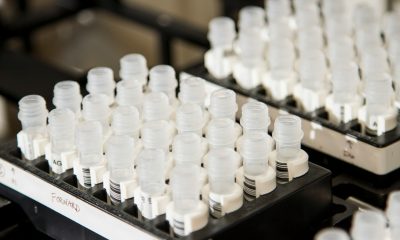Biotech
Incliva Joins a European Project to improve Post-Treatment of Women with Breast Cancer
Incliva participates in the $6.2 million (€5.2 million) European Rebecca project to address the post-treatment of breast cancer. The project will end in March 2025 and has a budget of $6.2 million (€5.2 million). The consortium brings together 12 partners from seven European countries and is coordinated by the Aristotle University of Thessaloniki

The Health Research Institute of the Hospital Clínico de Valencia (Incliva) is participating in the European Rebecca project, funded by the European Union’s Horizon 2020 research and innovation program, for breast cancer-induced chronic disease research using data from multiple sources. The project seeks to harness the potential of real-world data to improve existing clinical research and clinical workflows.
Rebecca (an acronym for REsearch on BrEast Cancer induced chronic conditions supported by Causal Analysis of multi-source data), will combine clinical data with data describing real-life patient behavior. It will therefore include physical activity, eating and sleeping habits, as well as information linked to their online interaction. These variables will be available thanks to the analysis of data from sensors and records collected through mobile and portable devices.
Read more about Rebecca project and find the latest financial headlines with our companion app Born2Invest.
Incliva participates in the $6.2 million (€5.2 million) European Rebecca project to address the post-treatment of breast cancer
The project will end in March 2025 and has a budget of $6.2 million (€5.2 million). The consortium brings together 12 partners from seven European countries and is coordinated by the Aristotle University of Thessaloniki. Over four years, clinical and technological universities, industry, public health experts, and patient associations will work together to create guidelines and practices aimed at post-cancer treatment.
Rebecca’s 360° platform will be offered to people who have overcome breast cancer to help them, on the one hand, in their daily lives; and improve, on the other hand, their interaction with health experts. The same system will be able to collect details of the functional and emotional state of patients during their participation in clinical research campaigns.
The platform, which complies with the preservation and protection of sensitive data, will be deployed in seven clinical studies involving 650 people in Spain, Norway, and Sweden and will contribute to creating future guidelines and practices for post-cancer treatment. The data collected will be processed by innovative causal analysis models. These will focus on the complex range of chronic comorbidities developed during recovery from breast cancer.
Incliva will conduct the study to improve research on cancer treatment-induced osteopathy
“In the era of the internet of things, big data, and machine learning it seems that clinical research can move beyond randomized controlled clinical trials. Real-world interventions may differ from the idealized interventions of randomized controlled clinical trials. Monitoring patients in their real-life conditions bridges the gap,” stresses Aristotle University of Thessaloniki professor and REebecca project coordinator Dr. Anastasios Delopoulos.
Incliva, under the coordination of Dr. Cristina Hernando, as principal investigator, and Drs. Juan Miguel Cejalvo, María Teresa Martínez, and Begoña Bermejo, from the Breast Cancer Biology Research Group and together with Drs. Antón Millet, Ana Martínez, Celia Bauset and Antonio Cano, from the Gynecology Service, will lead the intervention studies to improve patient outcomes through the use of real-world data and Spanish trials.
Specifically, Incliva will conduct the study to improve research on osteopathy induced by cancer treatment. It will also conduct the intervention study to improve clinical management and patient outcomes through monitoring.
In addition, Incliva participates in the identification of system needs and requirements, as well as in the design and integration of the system, providing the clinical perspective to the process. It will also contribute to the creation of causal inference models and retrospective data analysis. Finally, Incliva will collaborate in different activities for the improvement of clinical and research workflows using Rebecca.
__
(Featured image by marijana1 via Pixabay)
DISCLAIMER: This article was written by a third party contributor and does not reflect the opinion of Born2Invest, its management, staff or its associates. Please review our disclaimer for more information.
This article may include forward-looking statements. These forward-looking statements generally are identified by the words “believe,” “project,” “estimate,” “become,” “plan,” “will,” and similar expressions. These forward-looking statements involve known and unknown risks as well as uncertainties, including those discussed in the following cautionary statements and elsewhere in this article and on this site. Although the Company may believe that its expectations are based on reasonable assumptions, the actual results that the Company may achieve may differ materially from any forward-looking statements, which reflect the opinions of the management of the Company only as of the date hereof. Additionally, please make sure to read these important disclosures.
First published in iSanidad, a third-party contributor translated and adapted the article from the original. In case of discrepancy, the original will prevail.
Although we made reasonable efforts to provide accurate translations, some parts may be incorrect. Born2Invest assumes no responsibility for errors, omissions or ambiguities in the translations provided on this website. Any person or entity relying on translated content does so at their own risk. Born2Invest is not responsible for losses caused by such reliance on the accuracy or reliability of translated information. If you wish to report an error or inaccuracy in the translation, we encourage you to contact us.

-

 Biotech6 days ago
Biotech6 days agoVytrus Biotech Marks Historic 2024 with Sustainability Milestones and 35% Revenue Growth
-

 Crowdfunding2 weeks ago
Crowdfunding2 weeks agoColombia Approves Terrenta’s Crowdfunding Platform for Real Estate Financing
-

 Crypto16 hours ago
Crypto16 hours agoRipple Launches EVM Sidechain to Boost XRP in DeFi
-

 Africa1 week ago
Africa1 week agoCôte d’Ivoire Unveils Ambitious Plan to Triple Oil Output and Double Gas Production by 2030
























